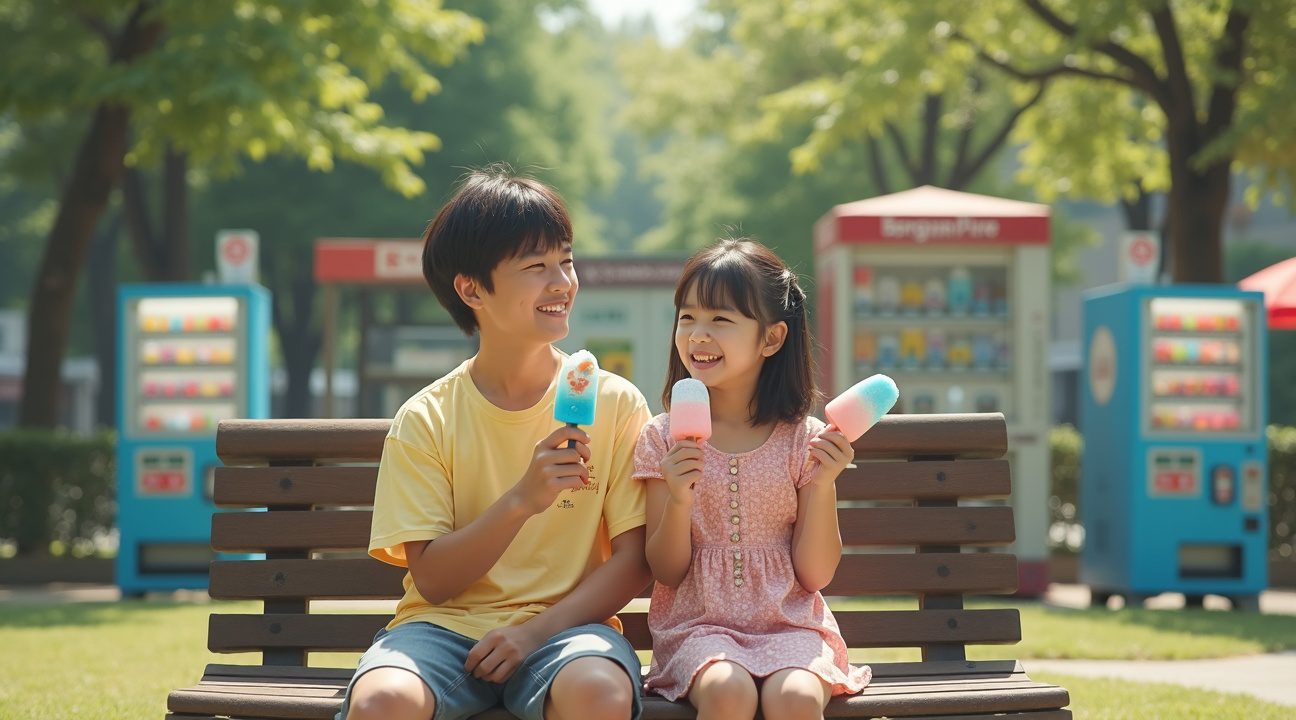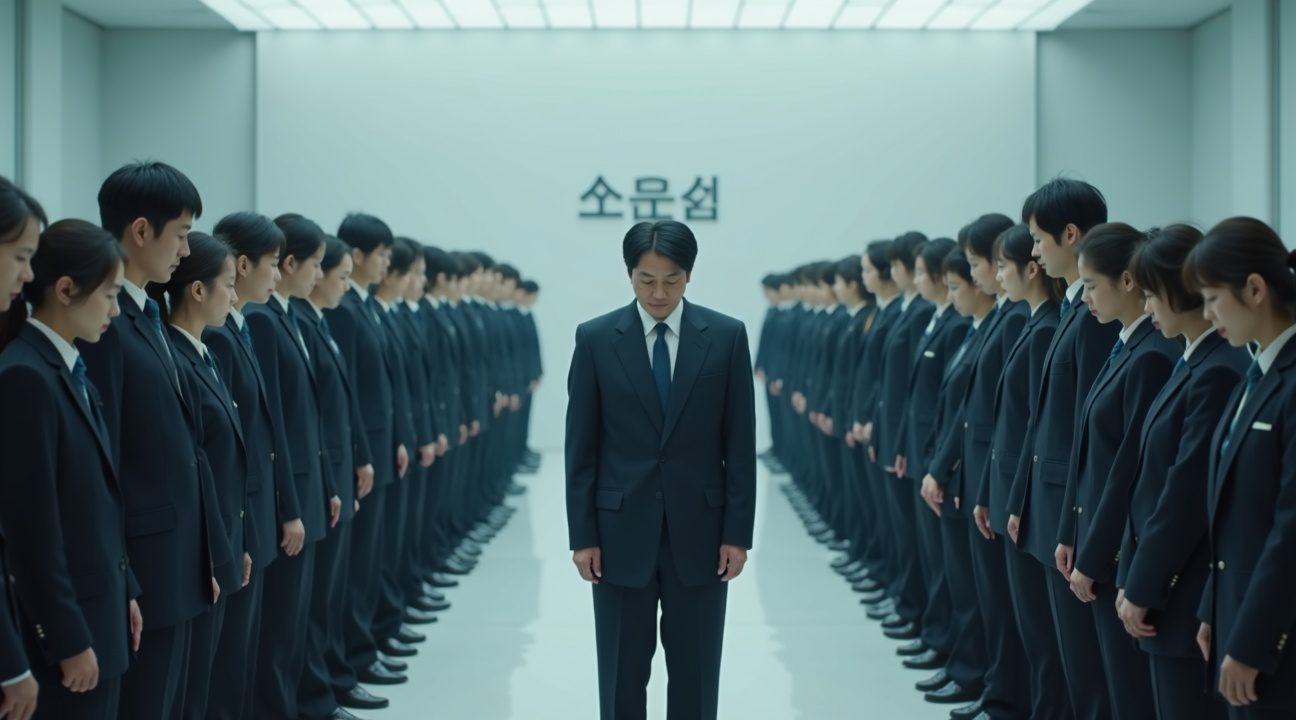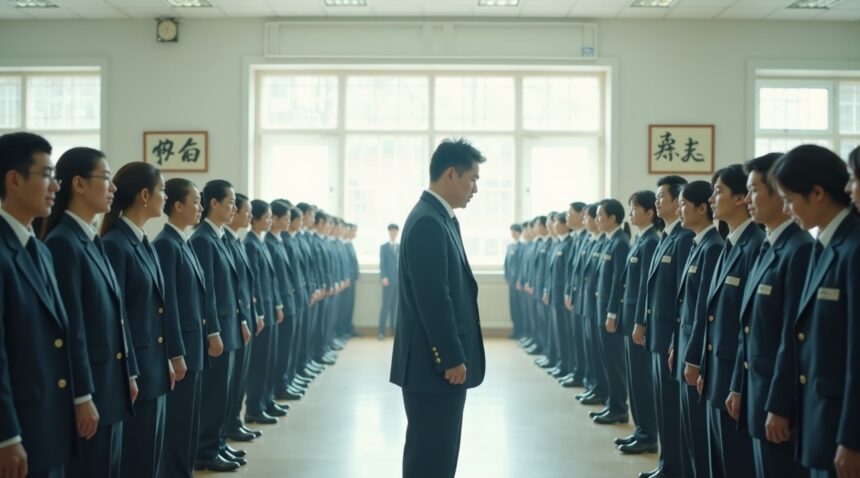Akagi Nyugyo, a Japanese ice cream company, made headlines with an extraordinary 60-second television commercial in which the entire staff bowed in unison to apologize for a modest price increase of their iconic Garigari-kun ice cream—raising the price by just 9 cents after 25 years of consistency.
Key Takeaways
- Maintaining Stability: The company had upheld a 60-yen price for a remarkable 25 years before increasing it to 70 yen, reflecting the notable cultural emphasis on price stability in Japanese business practices.
- Elaborate Apology: In a rare instance of corporate humility, the television commercial presented the company’s executives and staff bowing deeply while issuing a heartfelt apology—making it one of the most elaborate corporate apologies in Japan’s recent history.
- Global Response: The apology video quickly went viral, gaining more than one million views on YouTube, and sparking a global conversation about Japan’s unique corporate culture and the high value placed on customer relationships.
- Need for Change: A combination of rising production costs, increasing packaging expenses, and broader supply chain pressures left the company with a difficult choice between keeping prices low and maintaining long-term financial health.
- Cultural Reflection: This instance illustrates how customer-centric values in Japan often require companies to explain—even apologize—for operational changes that wouldn’t prompt a reaction in Western markets.
Entire Company Staff Bows in 60-Second TV Commercial Over 9-Cent Price Hike
Akagi Nyugyo created a remarkable 60-second television commercial that aired nationally across Japan, featuring an unprecedented display of corporate contrition. Company president Inoue Sota and chairman Hideki Inoue appeared alongside multiple staff members in what became one of the most sincere public apology commercials in recent Japanese business history.
Deep Bows and Corporate Humility
Throughout the commercial, viewers witnessed every staff member bowing deeply in unison, demonstrating the profound respect Japanese business culture places on customer relationships. This wasn’t a casual nod or brief acknowledgment – each person performed a formal bow that conveyed genuine remorse for the price increase. The visual impact of seeing an entire company’s leadership and workforce united in this gesture of apology created an emotional connection that transcended typical advertising approaches.
Japanese business culture treats customer trust as sacred, and breaking that trust – even through necessary price adjustments – requires meaningful acknowledgment. The staff bowing tradition represents one of the most powerful forms of corporate apology available, signaling that the company takes full responsibility for any inconvenience caused to their loyal customers.
Musical Messaging and 25-Year Promise
The commercial concluded with a poignant message that captured the company’s internal struggle: “We held on for 25 years but… 60 → 70.” This simple yet effective communication highlighted the quarter-century commitment Akagi Nyugyo maintained to keep prices stable, emphasizing that the increase from 60 to 70 yen wasn’t taken lightly.
Accompanying this message was a carefully selected folk song that enhanced the commercial’s sincerity and nostalgic appeal. The musical choice wasn’t random – folk music in Japanese culture often represents authenticity, tradition, and genuine emotion. This soundtrack reinforced the company’s commitment to maintaining their relationship with customers despite the necessary price adjustment.
The combination of visual humility through bowing and auditory nostalgia through traditional music created a comprehensive apology that resonated deeply with Japanese consumers. Rather than hiding behind corporate speak or justifying the increase with market conditions, Akagi Nyugyo chose transparency and vulnerability. This approach demonstrated how corporate apology traditions can maintain customer loyalty even during challenging business decisions.
The commercial’s effectiveness lay in its authentic representation of Japanese values. Customers understood that companies face economic pressures, but they expect acknowledgment when those pressures affect pricing. By dedicating an entire minute of national television time to this apology, Akagi Nyugyo showed they valued customer relationships above profit margins.
This public apology commercial became a masterclass in crisis communication within Japanese business culture. Instead of treating the price increase as a minor adjustment, the company elevated it to a significant corporate event deserving of formal recognition. The staff bowing ceremony wasn’t just about the 9-cent increase – it was about preserving the trust that had been built over 25 years of consistent pricing.
The commercial’s impact extended beyond immediate customer relations. It set a standard for how companies might handle similar situations, proving that transparency and humility often generate more positive outcomes than defensive corporate messaging. Competitors and business analysts took note of how a simple, sincere approach could transform a potentially negative situation into a demonstration of corporate values.
https://www.youtube.com/watch?v=Lkl–JJyqgM
Garigari-kun’s First Price Increase in 25 Years Sparks National Attention
In 2016, Akagi Nyugyo made headlines across Japan when they announced a price increase for their beloved Garigari-kun ice cream. The company raised the price from 60 yen to 70 yen—an increase of 10 yen, roughly equivalent to 9 cents USD at the time. This represented approximately a 16% price jump for the popular frozen treat.
What made this announcement particularly significant was that it marked the first price change for Garigari-kun in 25 years. The retail price had remained remarkably stable at 60 yen since 1991, maintaining consistency through various economic fluctuations and market changes. For a quarter-century, Japanese consumers could count on paying the same amount for their favorite ice cream, making it one of the most price-stable consumer products in the country.
Understanding the Business Pressures Behind the Decision
Akagi Nyugyo didn’t make this decision lightly. The company faced mounting pressure from several factors that had been building over the years:
- Rising production costs that had steadily increased since the product’s launch
- Escalating packaging material expenses due to global commodity price fluctuations
- Supply chain challenges that affected manufacturing efficiency
- Inflation pressures that had been gradually impacting the broader food industry
The company’s commitment to maintaining the 60-yen price point for so long demonstrated their dedication to affordability. However, by 2016, the financial strain had reached a point where continuing at the original price would have threatened the product’s long-term viability. Rather than compromise on quality or reduce portion sizes, Akagi Nyugyo chose transparency and decided to adjust the price while explaining their reasoning to consumers.
This price increase became a cultural moment in Japan, where stable pricing is often viewed as a sign of corporate responsibility. The decision reflected broader economic pressures affecting many Japanese companies during this period, as they grappled with similar cost increases while trying to maintain consumer loyalty. Corporate apologies for business decisions that affect consumers have become an important aspect of maintaining trust in Japanese business culture.
The Beloved Ice Cream That Defined Affordable Japanese Treats
Garigari-kun stands as one of Japan’s most cherished frozen treats, a simple popsicle that has captured hearts and taste buds for over four decades. Produced by Akagi Nyugyo since 1981, this ice cream bar has become synonymous with affordable indulgence across Japan.
Children and adults alike recognize the distinctive blue packaging and the satisfying crunch that gives Garigari-kun its name – “garigari” mimics the sound of biting into the textured ice. Akagi Nyugyo built their reputation on creating accessible frozen desserts that don’t break the bank, and Garigari-kun became their flagship product that exemplifies this philosophy.
Cultural Impact Beyond Just Frozen Treats
The popsicle’s significance extends far beyond its refreshing taste. I’ve observed how Garigari-kun has woven itself into the fabric of Japanese snack culture, representing reliability and consistency in an affordable treat. Families have passed down their love for these popsicles across generations, creating emotional connections that transcend simple consumer preferences.
This Japanese ice cream brand has maintained its position through decades of economic fluctuations by keeping prices remarkably stable. Convenience stores, supermarkets, and vending machines throughout Japan stock Garigari-kun, making it universally accessible regardless of location or economic status. The company’s commitment to affordability has made it a democratic treat – one that doesn’t discriminate based on purchasing power.
Akagi Nyugyo’s success with Garigari-kun demonstrates how consistent quality and pricing can create lasting brand loyalty. The company has introduced various flavors over the years, from classic soda to seasonal specialties, yet they’ve maintained the core appeal that made the original so beloved. This approach has helped them navigate changing consumer preferences while preserving what made their product special in the first place.
The popsicle’s popularity among children particularly highlights its cultural significance. Parents trust the brand for its quality and appreciate its affordability, while children develop lasting memories associated with the treat. This dual appeal has created a sustainable market that spans multiple demographics and age groups.
When companies like this one face the reality of price increases, it challenges deeply held expectations about accessibility and tradition. Similar situations have shown how brands must carefully balance economic necessities with consumer expectations. Garigari-kun’s story illustrates how some products become cultural institutions rather than mere commercial offerings, making any changes to their fundamental characteristics feel personally significant to consumers.

Viral Response: Over One Million YouTube Views and Cultural Debate
The apologetic television commercial struck an unexpected chord with audiences worldwide, rapidly accumulating over one million YouTube views within just a few days of its release. This massive viewership caught the ice cream company completely off guard, with representatives expressing genuine astonishment at the response. They stated, “It was beyond our imagination that the video would be watched so many times.“
International Attention and Cultural Analysis
The viral response extended far beyond Japan’s borders, capturing international attention and sparking widespread cultural debate. Foreign viewers found themselves fascinated by what many perceived as an extraordinarily humble gesture for such a modest price adjustment. Social media platforms buzzed with discussions comparing Japanese business culture to Western practices, with many users expressing both admiration and bewilderment at the company’s approach.
Media outlets across Asia, Europe, and North America picked up the story, analyzing the cultural implications of such a formal apology for a mere 9-cent increase. Cultural commentators began dissecting the incident as a window into Japanese corporate values and customer relationship management. Some praised the company’s transparency and respect for consumers, while others questioned whether such extreme humility was necessary or even productive for business operations.
The discourse revealed fascinating cultural divides in how different societies view corporate responsibility and customer communication. Western audiences generally viewed the apology as charmingly excessive, while many Japanese consumers appreciated the gesture as a demonstration of proper corporate etiquette. This cross-cultural reaction highlighted the varying expectations consumers have regarding corporate accountability and communication styles.
Public forums and comment sections became battlegrounds for debates about corporate transparency, customer respect, and whether businesses should apologize for necessary economic adjustments. Some argued that the company set an unrealistic precedent for other businesses, potentially creating customer expectations that could prove unsustainable during periods of economic pressure. Others countered that such genuine communication builds stronger customer loyalty and demonstrates corporate integrity that transcends mere profit motives.
The unexpected viral nature of the apology transformed what began as a simple price adjustment announcement into a global case study in corporate communication and cultural values.
https://www.youtube.com/watch?v=YOUTUBE_VIDEO_ID
Why This Apology Shocked Even Japan: Understanding Corporate Contrition Culture
Japanese corporate culture has long elevated public apologies to an art form, with companies routinely expressing deep regret for everything from product defects to service delays. Yet when a Japanese ice cream manufacturer aired a television commercial featuring executives and staff apologizing for a mere 9-cent price increase, even seasoned observers of Japanese business practices found themselves stunned by the display.
The Depth of Corporate Contrition on Full Display
The commercial went far beyond typical corporate messaging. Top executives appeared alongside general staff members, all bowing in perfect unison while expressing sincere regret for the necessity of raising prices. This choreographed display of humility represented something unprecedented — a formal apology for basic market economics rather than genuine wrongdoing or negligence.
What made this particular apology remarkable wasn’t just its existence, but its scale and production value. The company invested significant resources in creating a polished advertisement specifically to convey their remorse about price adjustments that most Western businesses would implement without fanfare. The visual of dozens of employees bowing simultaneously created a powerful image that resonated throughout Japanese media and beyond.
When Corporate Humility Crosses Cultural Boundaries
This incident sparked extensive discussion in Japanese media about the boundaries and expectations surrounding corporate apologies. Business analysts and cultural commentators debated whether the company had crossed a line from appropriate humility into excessive self-deprecation. The apology raised questions about whether Japanese corporate contrition culture had reached a point where companies felt compelled to apologize for legitimate business decisions.
The contrast with Western business practices became a focal point of analysis. While corporate apologies in Western markets typically address serious failures or ethical breaches, Japanese companies often apologize for inconveniencing customers in ways that would barely register elsewhere. This ice cream company’s commercial highlighted how deeply ingrained these cultural expectations have become.
Media coverage emphasized several key factors that made this apology particularly noteworthy:
- The significant financial investment in producing and airing the commercial
- The involvement of employees at all levels of the organization
- The formal, ritualistic nature of the presentation
- The precedent it set for future price-related corporate communications
The incident prompted broader reflection on whether Japanese corporate culture’s emphasis on customer service and humility had evolved to unsustainable levels. Business leaders across various industries began questioning whether similar apologies would be expected from their own companies when facing inevitable cost pressures.
Economic experts noted that the apology actually drew more attention to the price increase than a simple announcement would have generated. The irony wasn’t lost on observers that the company’s attempt to soften the impact of their pricing decision ultimately amplified public awareness of the change.
The commercial also highlighted generational differences in expectations. Younger Japanese consumers expressed surprise at the elaborate apology, while older demographics appeared more receptive to the gesture. This divide suggested that Japanese corporate contrition culture might be evolving as societal values shift.
International business communities watched the incident with fascination, recognizing it as an extreme example of cultural differences in corporate communication. The apology served as a case study for multinational companies operating in Japan, illustrating the complex expectations they face when making routine business adjustments.
The aftermath of this unprecedented apology continues to influence how Japanese companies approach sensitive communications with their customers. Whether this represents the peak of corporate contrition culture or simply another step in its evolution remains to be seen, but the ice cream company’s commercial has undeniably changed the conversation about corporate responsibility and customer relations in Japan.
https://www.youtube.com/watch?v=example

Business Pressures Behind the Historic Price Change
The increase from 60 yen to 70 yen represented a significant 16% price adjustment that Akagi Nyugyo couldn’t avoid any longer. While 9 cents might seem trivial to consumers in many markets, this decision carried enormous weight for a company that had maintained stable pricing for over two decades.
Economic Forces Driving the Decision
Akagi Nyugyo faced mounting pressure from sustained increases in production and packaging costs that had accumulated over years. Raw material prices, energy expenses, and supply chain disruptions created a perfect storm of financial challenges. The company could no longer absorb these rising costs internally without compromising product quality or business sustainability.
Manufacturing ice cream requires precise temperature control throughout production and distribution, making energy costs particularly impactful. Additionally, packaging materials experienced significant price volatility due to global supply chain issues. These factors combined to create an untenable situation where maintaining the 60-yen price point would threaten the company’s long-term viability.
Cultural Context of Price Stability
The fact that Akagi Nyugyo hadn’t changed their ice cream price for 25 years illustrates Japan’s unique cultural relationship with consumer pricing. Japanese businesses traditionally prioritize price stability as a form of customer loyalty and social responsibility. This approach creates intense pressure on companies to absorb cost increases rather than pass them along to consumers.
Such price stability expectations are deeply embedded in Japanese business culture, where sudden price changes can damage brand reputation and customer trust. Companies often view price increases as failures of operational efficiency rather than necessary business adjustments. This cultural framework explains why Akagi Nyugyo felt compelled to create an elaborate television commercial apologizing for what many Western companies would consider a routine business decision.
The 25-year price freeze also demonstrated the company’s commitment to value preservation, making the eventual increase feel particularly jarring to both the business and its customers. When price adjustments become this rare, they transform from routine business operations into significant corporate events requiring careful communication strategies. This situation mirrors broader challenges faced by Japanese companies trying to balance traditional customer expectations with modern economic realities, similar to how other brands handle public relations crises when consumer trust is at stake.
The economic pressures that forced this decision highlight the delicate balance between maintaining customer loyalty and ensuring business survival. Akagi Nyugyo’s response demonstrates how cultural values can shape corporate communication strategies, even for seemingly straightforward business decisions.
Sources:
The Independent, “Japanese company apologises for 9 cent price increase”
YouTube, “whole staff apologize for raising their price of the Icebar by only 9 cents!”


